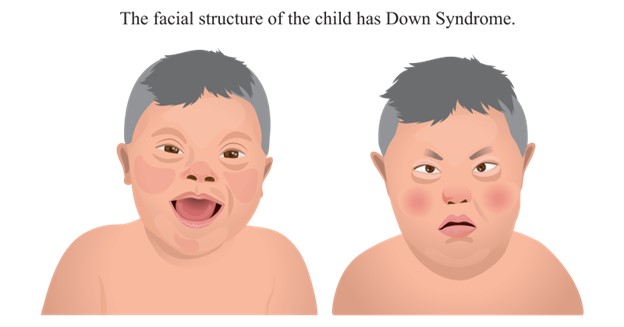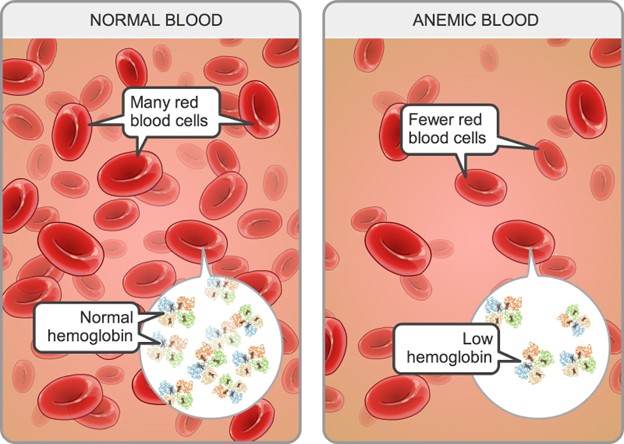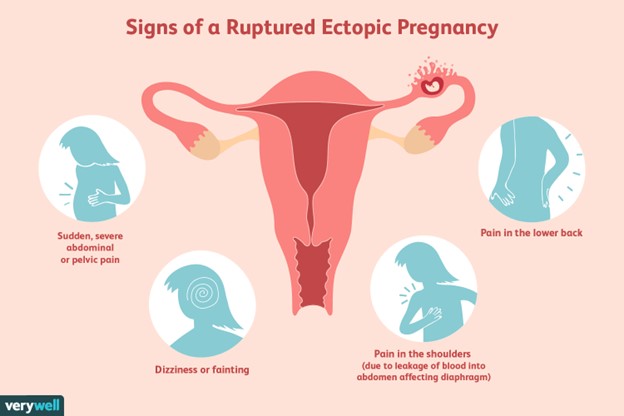While talking with a pregnant woman who has undergone genetic testing, the woman informs the nurse that her baby will be born with Down syndrome. The nurse understands that Down syndrome is an example of:
Trisomy numeric abnormality
Multifactorial inheritance
X-linked recessive inheritance
Chromosomal deletion
The Correct Answer is A
Choice A Reason: Trisomy numeric abnormality. Down syndrome is a genetic disorder that occurs when a person has three copies of chromosome 21 instead of two. This extra chromosome causes various physical and mental features that vary from person to person. Down syndrome is also called trisomy 21 because it involves three copies of chromosome 21.
Choice B Reason: Multifactorial inheritance is incorrect because it refers to a type of genetic disorder that results from the interaction of multiple genes and environmental factors. Examples of multifactorial disorders include cleft lip or palate, neural tube defects, diabetes, hypertension, and some types of cancer.
Choice C Reason: X-linked recessive inheritance is incorrect because it refers to a type of genetic disorder that affects males more than females because it is caused by a mutation on the X chromosome. Females have two X chromosomes, so they can be carriers or affected depending on whether they inherit one or two copies of the mutated gene. Males have one X chromosome and one Y chromosome, so they are always affected if they inherit the mutated gene from their mother. Examples of X-linked recessive disorders include hemophilia, color blindness, and Duchenne muscular dystrophy.
Choice D Reason: Chromosomal deletion is incorrect because it refers to a type of genetic disorder that occurs when a part of a chromosome is missing or deleted. This can cause various physical and mental problems depending on the size and location of the deletion. Examples of chromosomal deletion

Nursing Test Bank
Naxlex Comprehensive Predictor Exams
Related Questions
Correct Answer is A
Explanation
Choice A: Hemodilution of pregnancy is a normal physiological phenomenon that occurs when the plasma volume increases more than the red blood cell mass, resulting in a lower hemoglobin concentration. The normal hemoglobin range for pregnant women in the second trimester is 10.5 to 14 g/dL.
Choice B: A multiple gestation pregnancy may cause a higher hemoglobin level due to increased erythropoietin production by the placenta. The normal hemoglobin range for pregnant women with twins in the second trimester is 12 to 16 g/dL.
Choice C: Greater-than-expected weight gain is not related to hemoglobin level. Weight gain during pregnancy depends on various factors such as pre-pregnancy weight, nutrition, activity level, and fetal growth.
Choice D: Iron-deficiency anemia is a condition where the hemoglobin level is below the normal range due to inadequate iron intake or absorption, blood loss, or increased iron demand. The signs and symptoms of iron-deficiency anemia include fatigue, pallor, weakness, shortness of breath, and pica.

Correct Answer is A
Explanation
Choice A reason: Hemorrhage is the most life-threatening complication of a ruptured ectopic pregnancy, as it can lead to hypovolemic shock and death. The nurse should monitor the client's vital signs, blood loss, and level of consciousness, and administer fluids and blood products as ordered.
Choice B reason: Edema is not a common sign of a ruptured ectopic pregnancy, and it is not a priority over hemorrhage. Edema may be caused by other conditions, such as heart failure, kidney disease, or venous insufficiency.
Choice C reason: Infection is a possible complication of a ruptured ectopic pregnancy, but it is not as urgent as hemorrhage. Infection may manifest as fever, chills, malaise, or foul-smelling vaginal discharge. The nurse should administer antibiotics as ordered and monitor the client's temperature and white blood cell count.
Choice D reason: Jaundice is not a typical symptom of a ruptured ectopic pregnancy, and it is not a priority over hemorrhage. Jaundice may indicate liver dysfunction or hemolytic anemia, which are unrelated to ectopic pregnancy. The nurse should assess the client's skin and sclera color, and check the liver enzymes and bilirubin levels.

Whether you are a student looking to ace your exams or a practicing nurse seeking to enhance your expertise , our nursing education contents will empower you with the confidence and competence to make a difference in the lives of patients and become a respected leader in the healthcare field.
Visit Naxlex, invest in your future and unlock endless possibilities with our unparalleled nursing education contents today
Report Wrong Answer on the Current Question
Do you disagree with the answer? If yes, what is your expected answer? Explain.
Kindly be descriptive with the issue you are facing.
